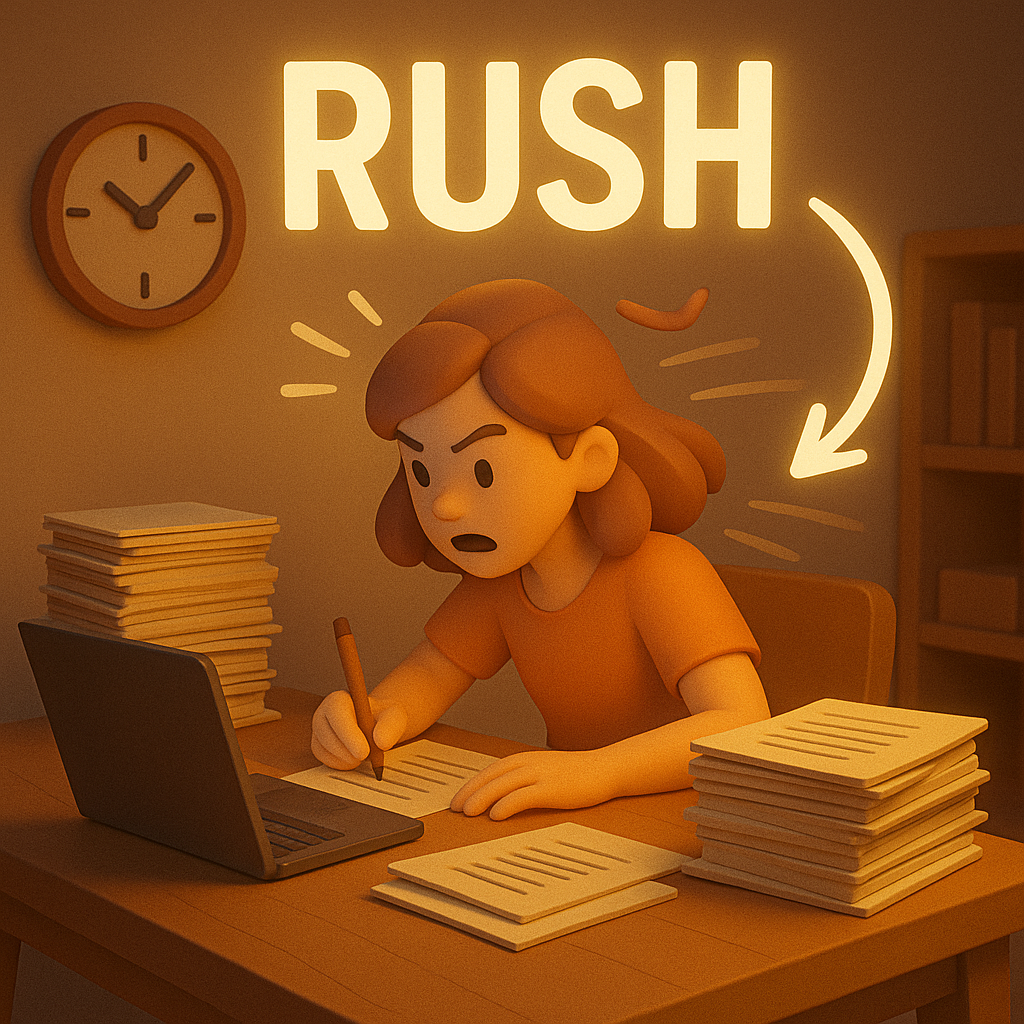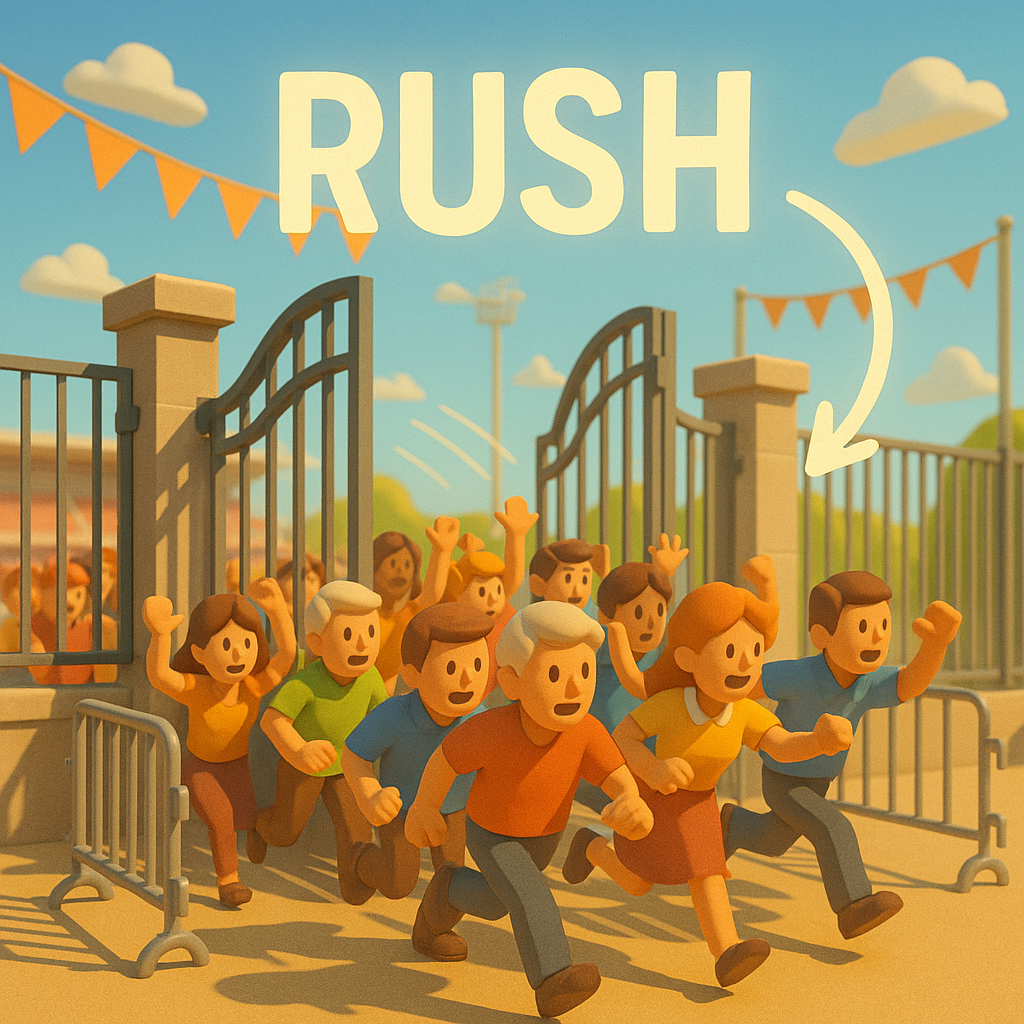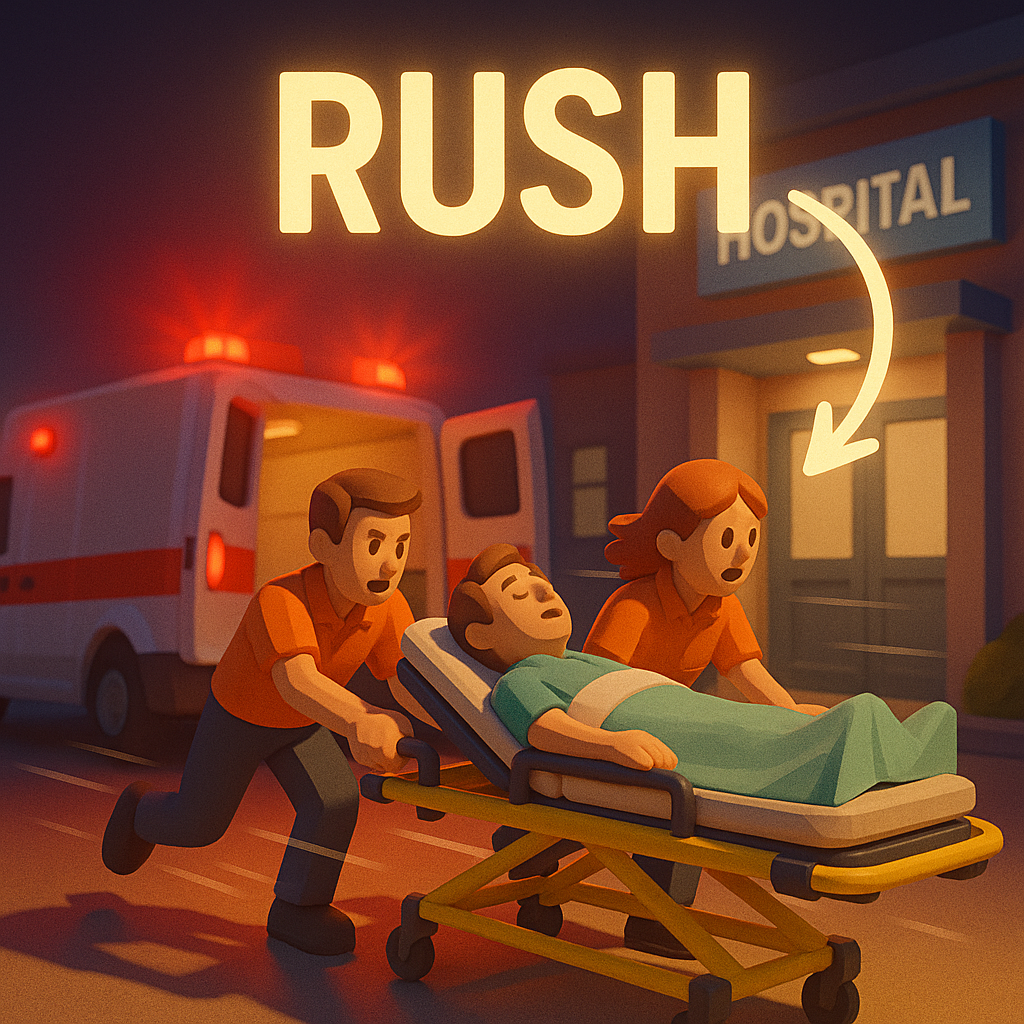Rush
Definition
Rush is a verb and a noun. As a verb, it means to move or act with great speed or urgency. As a noun, it refers to a sudden forward movement, a surge of emotion, or a busy period.
Parts of Speech
- Verb
- Noun
Pronunciation
American English
- IPA Pronunciation: /rʌʃ/
- Respelling: RUSH
British English
- IPA Pronunciation: /rʌʃ/
- Respelling: RUSH
Etymology
The word "rush" originates from Middle English "ruschen," likely derived from Old French "ruser," meaning "to push or drive back." Its modern meaning developed during the 15th century.
Derivatives
- Rusher (noun)
- Rushing (verb form)
- Rush-hour (noun)
- Overrush (verb)
- Rushy (adjective, describing something resembling a rush)
Synonyms
- Hurry
- Dash
- Surge
Antonyms
- Delay
- Pause
- None
Usage
The term "rush" is commonly used in everyday language to describe urgent actions, busy periods, or sudden movements. Examples include "He had to rush to catch the train" (verb) and "The holiday shopping rush has begun" (noun).
Related Terms
- Hurry: To move or act quickly.
- Surge: A sudden increase or forward movement.
- Dash: A quick or sudden movement.
Detailed Definitions
Verb
- To move or act quickly and urgently: Refers to speeding up due to time constraints or emergencies.
- Example: "She rushed to finish her assignment before the deadline."
- To move forward with force: Refers to sudden or aggressive motion.
- Example: "The crowd rushed through the gates as they opened."
- To transport or send quickly: Refers to expediting delivery or movement.
- Example: "The paramedics rushed the patient to the hospital."
Noun
- A sudden forward motion: Refers to a quick movement or advance.
- Example: "There was a rush of water during the flood."
- A surge of emotion or sensation: Refers to a strong feeling or excitement.
- Example: "He felt a rush of adrenaline during the race."
- A busy or crowded period: Refers to times of high activity or demand.
- Example: "The morning rush at the cafe was overwhelming."
rush



🇨🇳 Mandarin
- 冲 (Rush in a sense of moving quickly): Chōng
- IPA: /ʈʂʰʊ́ŋ/
- Respell: Chung
- 抢购 (Rush in a sense of a sudden influx): Qiǎnggòu
- IPA: /tɕʰi̯ɑ̌ŋkòu/
- Respell: Chiang-koh
🇮🇳 Hindi
- दौड़ना (Rush in a sense of moving quickly): Daurna
- IPA: /d̪ɔːɽ.naː/
- Respell: Daur-na
- भीड़ (Rush in a sense of a sudden influx): Bhīṛ
- IPA: /bʱiːɽ/
- Respell: Bheer
🇪🇸 Spanish
- Apresurarse (Rush in a sense of moving quickly): Apresurarse
- IPA: /apresuˈɾaɾse/
- Respell: A-pre-su-rar-se
- Afluencia (Rush in a sense of a sudden influx): Afluencia
- IPA: /afluˈenθja/
- Respell: A-flu-en-thia
🇫🇷 French
- Se précipiter (Rush in a sense of moving quickly): Se précipiter
- IPA: /sə pʁesipite/
- Respell: Se pre-see-pee-tay
- Afflux (Rush in a sense of a sudden influx): Afflux
- IPA: /afly/
- Respell: Aff-luh
🇸🇦 Modern Standard Arabic
- يندفع (Rush in a sense of moving quickly): Yandafea
- IPA: /jan.da.fæʕ/
- Respell: Yan-da-fea
- إقبال (Rush in a sense of a sudden influx): Iqbal
- IPA: /ʔiq.bal/
- Respell: Ik-bal
🇧🇩 Bengali
- দৌড়ানো (Rush in a sense of moving quickly): Đaura'nō
- IPA: /ɖauɽano/
- Respell: Dau-rano
- আপ্লুতি (Rush in a sense of a sudden influx): Āpluti
- IPA: /aːpluti/
- Respell: Aa-plu-ti
🇷🇺 Russian
- Мчаться (Rush in a sense of moving quickly): Mchat'sya
- IPA: /mʈ͡ʂat͡sʲa/
- Respell: Mchats-ya
- Поток (Rush in a sense of a sudden influx): Potok
- IPA: /potok/
- Respell: Po-tok
🇵🇹 Portuguese
- Apressar-se (Rush in a sense of moving quickly): Apressar-se
- IPA: /ɐpɾeˈsaɾsɨ/
- Respell: A-pre-sar-se
- Afluência (Rush in a sense of a sudden influx): Afluência
- IPA: /ɐflwˈẽsjɐ/
- Respell: Af-lu-en-cia
🇮🇩 Indonesian
- Buru-buru (Rush in a sense of moving quickly): Buru-buru
- IPA: /buru-buru/
- Respell: Bu-ru-bu-ru
- Lonjakan (Rush in a sense of a sudden influx): Lonjakan
- IPA: /lonjakan/
- Respell: Lon-ja-kan
🇩🇪 German
- Eilen (Rush in a sense of moving quickly): Eilen
- IPA: /ˈaɪ̯lən/
- Respell: Eye-len
- Ansturm (Rush in a sense of a sudden influx): Ansturm
- IPA: /ˈanʃtʊʁm/
- Respell: An-shturm
🇯🇵 Japanese
- 急ぐ (Rush in a sense of moving quickly): Isogu
- IPA: /isoɡɯ̟ᵝ/
- Respell: I-so-gu
- 殺到 (Rush in a sense of a sudden influx): Sattoū
- IPA: /sat.toː/
- Respell: Sat-toh
🇻🇳 Vietnamese
- Vội vàng (Rush in a sense of moving quickly): Vội vàng
- IPA: /ʋəjˀ˨˩ʔ vaːjŋ˨˩/
- Respell: Voi vang
- Đổ xô (Rush in a sense of a sudden influx): Đổ xô
- IPA: /ɗo˧ˀ˨ʔ ɕo˧˧/
- Respell: Do sho
🇰🇷 Korean
- 서두르다 (Rush in a sense of moving quickly): Seodureuda
- IPA: /sʌduɾɯda/
- Respell: Seo-du-reu-da
- 밀려들다 (Rush in a sense of a sudden influx): Millyeodeulda
- IPA: /miljʌdʌlda/
- Respell: Mil-lyeo-deul-da
🇹🇷 Turkish
- Acele etmek (Rush in a sense of moving quickly): Acele etmek
- IPA: /aˈdʒele etmek/
- Respell: A-je-le et-mek
- Akın (Rush in a sense of a sudden influx): Akın
- IPA: /ˈakin/
- Respell: A-kin
🇵🇰 Urdu
- دوڑنا (Rush in a sense of moving quickly): Dorna
- IPA: /doɽna/
- Respell: Dor-na
- سیلاب (Rush in a sense of a sudden influx): Selab
- IPA: /seːlab/
- Respell: Se-lab





